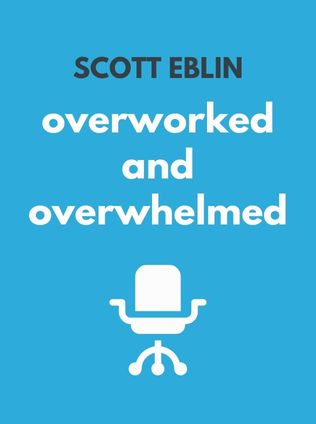
Overworked and Overwhelmed
The Mindfulness Alternative
By Scott Eblin
Published 09/2014
About the Author
Scott Eblin is the co-founder and president of the Eblin Group, a professional development firm that supports executives and managers in exhibiting leadership presence by being fully present. As an executive coach, educator, and author, Eblin works with senior and rising leaders in some of the world's best-known and regarded organizations. He is also the author of The Next Level: What Insiders Know About Executive Success (2010). Eblin's extensive experience in coaching and leadership development informs his practical approach to mindfulness and productivity in his book Overworked and Overwhelmed: The Mindfulness Alternative.
Main Idea
Overworked and Overwhelmed: The Mindfulness Alternative by Scott Eblin addresses the pervasive issue of stress and burnout among professionals in a 24/7 world. Eblin offers practical mindfulness strategies to help individuals manage their stress, improve their productivity, and enhance their overall quality of life. The book emphasizes that mindfulness does not require extensive meditation but can be integrated into daily routines to make a significant difference.
Table of Contents
- Introduction
- The Reality of Overwork and Overwhelm
- The Basics of Mindfulness
- Creating Mindful Routines
- Physical Routines for Better Health
- Mental Routines for Clarity and Focus
- Relational Routines for Stronger Connections
- Spiritual Routines for Deeper Purpose
- Applying Mindfulness in Daily Life
- Conclusion
Introduction
In today's fast-paced world, professionals often find themselves overworked and overwhelmed due to constant connectivity and high demands. Eblin highlights how the widespread use of smartphones has increased work hours and stress levels. He introduces mindfulness as a practical solution to these challenges, offering strategies that can be easily incorporated into daily life to reduce stress and enhance performance.
"Mindfulness is the awareness that arises by paying attention on purpose in the present moment and nonjudgmentally." - Jon Kabat-Zinn
The Reality of Overwork and Overwhelm
Eblin discusses the dual impact of corporate restructuring and the rise of smartphones on professionals' stress levels. He explains that the constant connectivity leads to extended work hours, leaving little time for personal care and relaxation. This chronic state of overwork triggers the body's fight or flight response, which can have detrimental effects on both mental and physical health.
"The typical smartphone-carrying professional is connected to work 72 hours a week." - Scott Eblin
Understanding these factors is crucial for finding effective solutions:
- Recognizing the impact of corporate restructuring on job demands.
- Understanding how smartphone use extends work hours.
- Identifying the physical and mental health consequences of chronic stress.
Corporate restructuring often leads to fewer employees handling the same or greater workloads, contributing to stress and burnout. Additionally, smartphones blur the line between work and personal life, making it difficult for professionals to disconnect and recharge. Eblin emphasizes the need for boundaries and mindful practices to counter these effects.
The Basics of Mindfulness
Eblin provides a straightforward definition of mindfulness and its key components: awareness, purposeful attention, present-moment focus, and nonjudgmental observation. He explains how mindfulness helps manage the gap between thoughts and actions, allowing individuals to respond more intentionally and effectively to stressors.
"Mindfulness is about managing the gap between your thoughts and actions." - Scott Eblin
Key aspects of mindfulness include:
- Awareness: Noticing what is happening both internally and externally.
- Purposeful Attention: Choosing to focus on the present moment.
- Nonjudgmental Observation: Avoiding labels of good or bad for experiences and thoughts.
Eblin underscores that mindfulness is not about escaping reality but engaging with it more fully and effectively. By becoming more aware of one's thoughts and feelings, individuals can make more deliberate choices about how to respond to various situations, reducing stress and enhancing performance.
Creating Mindful Routines
Mindful routines are essential for integrating mindfulness into everyday life. Eblin suggests developing physical, mental, relational, and spiritual routines that support mindfulness. These routines help individuals stay grounded and focused, reducing the feeling of being overwhelmed.
"Small increases in mindfulness can lead to big changes in productivity and quality of life." - Scott Eblin
Types of mindful routines:
Sign up for FREE and get access to 1,400+ books summaries.
You May Also Like
The Subtle Art of Not Giving a F*ck
A Counterintuitive Approach to Living a Good Life
By Mark MansonRich Dad Poor Dad
What the Rich Teach Their Kids About Money - That the Poor and Middle Class Do Not!
By Robert T. KiyosakiHow To Win Friends and Influence People
The All-Time Classic Manual Of People Skills
By Dale CarnegieQuiet: The Power of Introverts
The Power of Introverts in a World That Can't Stop Talking
By Susan Cain



















